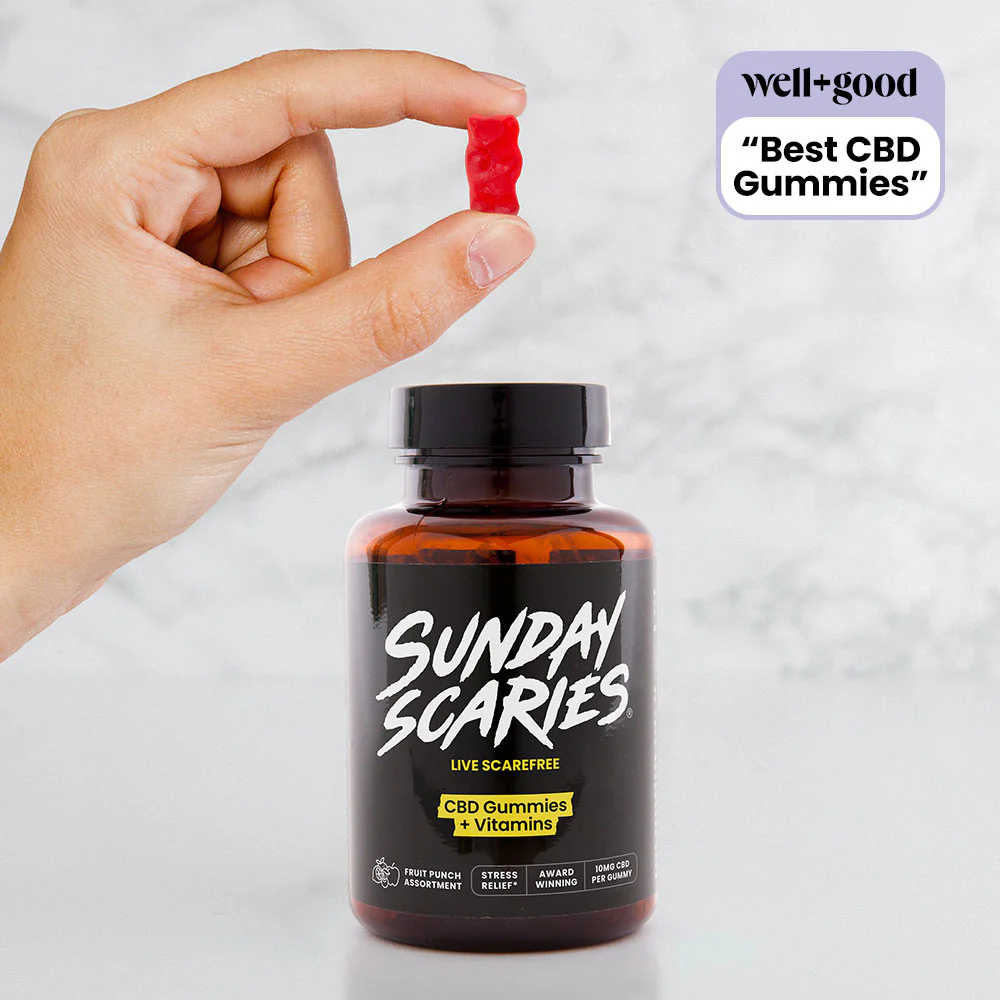By: Terrence Shenfield, MS, RRT-ACCS, RPFT, NPS, AE-C
Finding Relief: Can CBD Gummies Help with Back Pain?
Back pain is a widespread issue, affecting millions of people globally and significantly impacting their quality of life. From a dull, persistent ache to sharp, debilitating pain, this condition can make even simple daily activities feel like monumental tasks. Many individuals cycle through various treatments, from physical therapy and medication to more invasive procedures, often with mixed results. In the search for effective and accessible relief, many are now turning their attention to cannabidiol, or CBD, a compound found in the cannabis plant.
Specifically, CBD gummies for back pain are gaining popularity as a convenient and palatable option. But what does the science say? Can a simple, chewable gummy truly offer relief from chronic or acute back pain? This comprehensive guide will explore the potential of CBD for managing back pain. We will look into how CBD works, the benefits of choosing gummies, what to look for when you buy CBD gummies for pain relief, and how to incorporate them into your wellness routine safely and effectively.
Understanding Back Pain and Its Causes
Before we examine CBD's role, it's important to understand what causes back pain. The back is a complex structure of bones, joints, ligaments, and muscles. Pain can arise from a variety of issues, including:
- Muscle or Ligament Strain: Often caused by improper lifting, sudden awkward movements, or overuse.
- Bulging or Ruptured Disks: The soft cushions between your vertebrae can bulge or rupture, pressing on a nerve and causing pain.
- Arthritis: Osteoarthritis can affect the lower back, leading to a narrowing of the space around the spinal cord, a condition known as spinal stenosis.
- Skeletal Irregularities: Conditions like scoliosis, a curvature of the spine, can lead to back pain, usually in middle age.
- Inflammation: Chronic inflammation is a key driver of many types of pain, including pain related to autoimmune conditions or injury.
Traditional treatments often involve nonsteroidal anti-inflammatory drugs (NSAIDs), physical therapy, or in severe cases, prescription painkillers. However, these options are not always effective for everyone and can come with unwanted side effects, leading people to seek alternative solutions.
What is CBD and How Does It Work?
CBD is one of over 100 chemical compounds known as cannabinoids found in the cannabis sativa plant. Unlike tetrahydrocannabinol (THC), the plant's main psychoactive cannabinoid, CBD is not intoxicating. This means it doesn’t produce the "high" associated with marijuana use, making it an appealing option for those seeking therapeutic benefits without mind-altering effects.
CBD interacts with the body's endocannabinoid system (ECS). The ECS is a complex cell-signaling system that plays a crucial role in regulating a range of functions and processes, including sleep, mood, appetite, memory, and importantly, pain perception. The ECS consists of endocannabinoids (compounds our body produces), receptors (CB1 and CB2), and enzymes.
Research suggests that CBD may influence the ECS in several ways to help manage pain:
- Reducing Inflammation: Inflammation is a natural response to injury, but chronic inflammation can cause persistent pain. Studies indicate that CBD has potent anti-inflammatory properties, which can help reduce the swelling and discomfort associated with conditions like arthritis or muscle strains. By targeting inflammatory pathways, CBD may address one of the root causes of back pain.
- Alleviating Neuropathic Pain: Neuropathic pain results from nerve damage, often described as a shooting or burning sensation. This is common in conditions like sciatica or from a ruptured disk. CBD appears to interact with receptors in the brain and nervous system that are involved in pain signaling, potentially desensitizing them and reducing the perception of pain.
- Improving Sleep and Reducing Anxiety: Chronic pain and poor sleep often go hand-in-hand. Pain can make it difficult to fall asleep, and a lack of restorative sleep can worsen pain perception. Furthermore, living with chronic pain can lead to anxiety and stress, which can increase muscle tension and exacerbate back pain. CBD is widely used to promote relaxation and improve sleep quality, which can be immensely beneficial for those dealing with persistent back discomfort.
Why Choose CBD Gummies for Back Pain?
While CBD is available in many forms—including oils, tinctures, capsules, and topicals—gummies offer a unique set of advantages, especially for managing a chronic issue like back pain.
First, CBD gummies for back pain provide a pre-measured dose in each piece. This eliminates the guesswork involved with using a dropper for oils or tinctures, ensuring you get a consistent and accurate amount of CBD every time. Consistency is key when using CBD for therapeutic purposes, as it helps you track what dosage works best for your body and maintain stable levels of the compound in your system. This makes it easier to establish an effective wellness routine.
Second, gummies are incredibly discreet and convenient. They look just like any other candy, allowing you to take them at work, while traveling, or in any public setting without drawing attention. You don’t need water to swallow them like a capsule, and there’s no mess or potential for spills like with an oil. This ease of use makes it more likely that you’ll stick with your CBD regimen. For those moments when stress and pain build up, a simple gummy from a brand like Sunday Scaries can be an accessible way to find calm. You can find their products here: https://sunday-scaries.pxf.io/o4aKvg.
Finally, many people simply prefer the taste. CBD oils have a distinct earthy, hempy flavor that some find unpleasant. Gummies mask this taste with sweet, fruity flavors, making your daily dose of CBD an enjoyable treat rather than a chore. This palatability is a significant factor for long-term use. When looking to buy CBD gummies for pain relief, the pleasant experience they offer is a major selling point.
Finding the Right Strength: The Importance of Potency
When you begin your search for CBD gummies, you will quickly notice that they come in various strengths, or potencies, typically measured in milligrams (mg) of CBD per gummy. For significant issues like chronic back pain, many users find that standard low-dose gummies are not sufficient. This is where strong CBD gummies for back pain become a crucial consideration.
A "strong" gummy might contain anywhere from 25mg to 50mg of CBD or even more per piece. The right dosage is highly individual and depends on several factors, including:
- Your body weight and metabolism: Individuals with a higher body weight or a faster metabolism may require a higher dose to feel the effects.
- The severity of your pain: Mild, occasional backaches may respond to a lower dose (10-15mg), while chronic, severe pain will likely require a more potent product.
- Your body’s unique chemistry: Everyone’s endocannabinoid system is different, meaning some people are naturally more or less sensitive to CBD.
Starting low and going slow is the universally recommended approach. You might begin with a 10mg or 15mg gummy and see how you feel after a couple of hours. Since gummies are edibles, they must pass through your digestive system before the CBD enters your bloodstream. This process can take anywhere from 45 minutes to two hours. Be patient and avoid taking more until you’ve given the first dose ample time to work.
If you don't notice any improvement in your pain levels after a few days at a lower dose, you can gradually increase the amount. You might try taking two gummies instead of one or switching to strong CBD gummies for back pain. Keeping a simple journal to track your dosage, the time you took it, and your pain levels can be very helpful in finding your optimal dose. For a wider selection of CBD products, including various strengths, you can explore the options at ATECAM's Health Category Page.
How to Buy CBD Gummies for Pain Relief: A Quality Checklist
The CBD market is largely unregulated, which means the quality and safety of products can vary dramatically. To ensure you are getting a safe and effective product, it’s essential to be a discerning consumer. Here’s what to look for when you decide to buy CBD gummies for pain relief:
- Third-Party Lab Testing: This is the most critical factor. A reputable company will send its products to an independent, third-party laboratory to verify their potency and purity. The lab report, often called a Certificate of Analysis (COA), should be readily available on the company’s website. The COA confirms that the product contains the amount of CBD advertised and is free from harmful contaminants like pesticides, heavy metals, and residual solvents.
- Source of Hemp: The quality of the hemp plant matters. Look for products made from organically grown, U.S.-based hemp. Hemp is a bio-accumulator, meaning it can absorb toxins from the soil. Organic farming practices ensure the plant is grown without harmful chemicals, resulting in a cleaner final product.
- Type of CBD Extract: You will encounter three main types of CBD extract:
-
- Full-Spectrum: Contains all the cannabinoids, terpenes, and flavonoids from the hemp plant, including trace amounts of THC (legally, less than 0.3%). Many users prefer full-spectrum products due to the "entourage effect," a theory suggesting that the compounds work better together than they do in isolation.
- Broad-Spectrum: Contains a wide range of cannabinoids and terpenes but has had the THC completely removed. This is a great option for those who want the benefits of the entourage effect without any THC. Products like those from Sunday Scaries often use broad-spectrum CBD to ensure peace of mind. Check them out here: https://sunday-scaries.pxf.io/o4aKvg.
- CBD Isolate: This is 99% pure CBD, with all other plant compounds removed. It is tasteless and odorless and is the best choice for individuals who want to avoid THC and other cannabinoids entirely.
- Clear Labeling: The product label should clearly state the total amount of CBD in the package and the amount of CBD per gummy. It should also list all ingredients, including the type of sweetener used (look for natural options over high-fructose corn syrup) and any other active ingredients.
By following this checklist, you can confidently navigate the market and choose high-quality CBD gummies for back pain.
Integrating CBD Gummies into Your Wellness Routine
CBD is not a magic cure, but rather a tool that can be part of a holistic approach to managing back pain. To get the most out of your CBD gummies, consider integrating them with other healthy habits.
- Combine with Gentle Exercise: Activities like stretching, yoga, and walking can help strengthen your back muscles, improve flexibility, and reduce pain. Taking a CBD gummy before a gentle yoga session may help ease discomfort and allow you to move more freely.
- Focus on Anti-Inflammatory Nutrition: Your diet plays a significant role in managing inflammation. Incorporate foods rich in omega-3 fatty acids (like salmon and flaxseeds), antioxidants (like berries and leafy greens), and other anti-inflammatory compounds. CBD can complement these dietary efforts.
- Practice Mindfulness and Stress Reduction: As mentioned, stress can worsen pain. Practices like meditation, deep breathing exercises, and spending time in nature can help calm your nervous system. A CBD gummy can enhance this sense of relaxation. Many people use brands like Sunday Scaries specifically for their calming effects. You can explore their offerings for stress relief here: https://sunday-scaries.pxf.io/o4aKvg.
- Consult with a Healthcare Professional: Before starting any new supplement, including CBD, it’s always wise to talk to your doctor. This is especially important if you are taking other medications, as CBD can interact with certain drugs. A healthcare provider can help you determine if CBD is a safe and appropriate option for you.
The Takeaway
Living with back pain can be an exhausting and frustrating experience. While traditional treatments remain important, alternative options like CBD gummies for back pain are providing hope and relief for many. By offering anti-inflammatory and pain-relieving properties in a convenient, pre-dosed, and enjoyable form, gummies represent a practical way to incorporate CBD into a pain management plan.
When you decide to buy CBD gummies for pain relief, remember to prioritize quality by looking for third-party lab testing, organic hemp sources, and clear labeling. Whether you need standard-strength gummies for mild aches or strong CBD gummies for back pain that is more persistent, starting with a low dose and gradually adjusting is the best path forward.
By combining CBD with other healthy lifestyle choices, you can create a comprehensive strategy to manage your back pain and reclaim your quality of life. For more information on various CBD products and their potential benefits, feel free to visit ATECAM's Health Category Page to continue your journey toward wellness.
ATECAM Health and Wellness participates in the Sunday Scaries Program, an affiliate advertising program designed to provide a means for sites to earn advertising fees by advertising and linking to Sunday Scaries products.
References
- Vučković, S., Srebro, D., Vujović, K. S., Vučetić, Č., & Prostran, M. (2018). Cannabinoids and Pain: New Insights From Old Molecules. Frontiers in Pharmacology, 9, 1259.
- Hammell, D. C., Zhang, L. P., Ma, F., Abshire, S. M., McIlwrath, S. L., Stinchcomb, A. L., & Westlund, K. N. (2016). Transdermal cannabidiol reduces inflammation and pain-related behaviours in a rat model of arthritis. European Journal of Pain, 20(6), 936–948.
- Shannon, S., Lewis, N., Lee, H., & Hughes, S. (2019). Cannabidiol in Anxiety and Sleep: A Large Case Series. The Permanente Journal, 23, 18–041.
- Argueta, D. A., Ventura, C. M., Kiven, S., Sagi, V., & Gupta, K. (2020). A Balanced Approach for Cannabidiol Use in Chronic Pain. Frontiers in Pharmacology, 11, 561.
- Iffland, K., & Grotenhermen, F. (2017). An Update on Safety and Side Effects of Cannabidiol: A Review of Clinical Data and Relevant Animal Studies. Cannabis and Cannabinoid Research, 2(1), 139–154.



